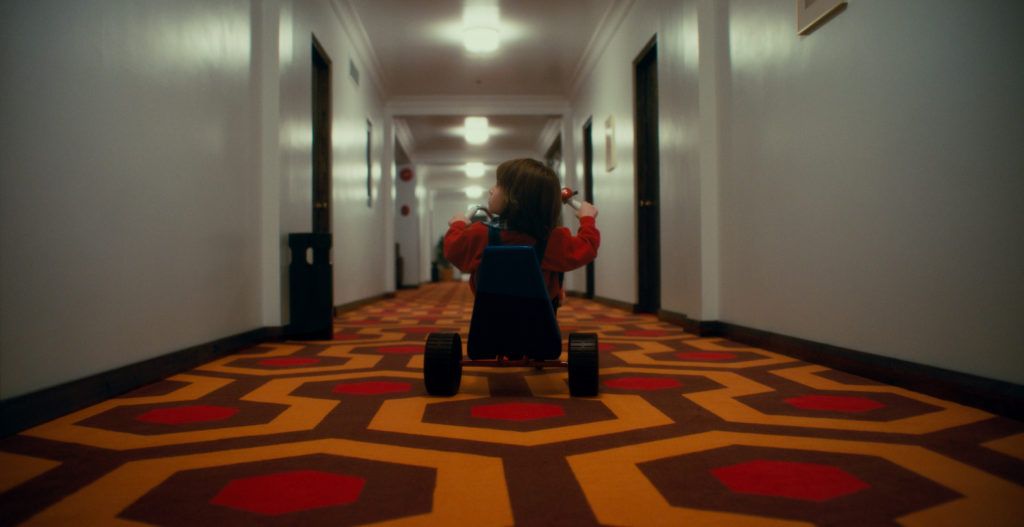Doctor Sleep

ROGER DALE FLOYD as Young Danny in the Warner Bros. Pictures’ supernatural thriller “STEPHEN KING’S DOCTOR SLEEP,” a Warner Bros. Pictures release.
In the years following the horrors of the Overlook Hotel in Colorado, Danny Torrance (Ewan McGregor) and his mother move as far away as possible, to Florida. There, he learns to compartmentalize his fears—visualized as sarcophagi in which he traps their apparitions. Elsewhere, a series of kidnappings occur at the hands of The True Knot—a group of inhuman(e) psychics led by a bohemian witch, Rose the Hat (Rebecca Ferguson).
Rose’s clan pursues a small town’s baseball prodigy, Bradley Trevor (Jacob Tremblay). He possesses what Danny calls The Shining—inspired by John Lennon’s lyrics for “Instant Karma”—premonitions, telepathy, telekinesis, transmigration, and beyond. Pain and fear coax the essence of this magic, known as “steam,” from the mouths of children. Think of the villains in MONSTERS, INC., but wearing bolero hats and kaftans.
Now in his forties, getting in bar fights in New Hampshire, Danny’s visions return. Driven by his guilt for abandoning a woman he’d slept with while on a bender, he’s haunted by her ghost. Danny finds solace using his gifts to assuage the fears of terminal hospice patients whose deaths are foretold by the resident cat. If Azzie scratches at your door, it’s bad news.
Fifteen-hundred miles away, the precocious telepath Abra Stone (Kyleigh Curran) connects with Danny. Channeled through him, she sees his past. Sensing Bradley’s abduction, she alerts Danny—messages appear on his chalkboard. Overcoming Danny’s reticence by convincing him of the child’s imminent harm, the two forge a friendship as they pursue the True Knot. Through tricks and traps, they close in on the gang, while thwarting Rose’s attempts to throw them off the trail.
Director Mike Flanagan’s DOCTOR SLEEP is to Stanley Kubrick’s THE SHINING what Peter Hyams’ 2010 is to 2001: A SPACE ODYSSEY. Big directors want to express big ideas in big ways—story is secondary. A master storyteller, King’s disapproval (and Burgess before him) of Kubrick’s adaptation is well known—likening it to a pretty car without an engine. Actors are less creators of performances than objects for Kubrick to move through a shot.
An entire field of experimental filmmaking suits this approach. It reeks of laziness, however, when hiring actors as talented as Jack Nicholson and Shelley Duvall to overrun a great novelist’s story and, in the process, completely miss its point.
King’s works often center around themes of childhood—loss of innocence, courage in the face of evil, and the adults in whom it manifests. The bonds of friendship counteract adults racing against the finiteness of their existence. King envisions evil as what happens when grown-ups usurp children’s innocence, creativity, and future. In DOCTOR SLEEP, this thesis comes into a view clearer than in most, if not all, prior adaptations of the novelist’s work.
Edited by Flanagan himself, the film plays like we’re watching a book, not an adapted screenplay. Scenes speak in literary vernacular—cross-dissolving between third person narratives and first person inner dialogues. One scene depicting astral projection triumphs here. By maintaining contact with reality through cutaways every few beats, we’re given a realistic visualization of a conceptual event. It plays like a dream, or a lens into one’s imagination, during which the internal logic makes sense to itself without compromising the rest of the story’s separation of the real and fantastical.
The weakness, if one exists, lies in Flanagan’s difficult task of linking this story to the popular imagery from THE SHINING. There’s a self-serious, formalism at work in Kubrick’s scene compositions that disrupts the more intimate narrative in DOCTOR SLEEP—save for Danny’s confrontation with his father, played here with scenery-chewing aplomb by Henry Thomas. Watch Ewan McGregor’s Danny recede into preadolescent fragility when berated by the specter of his abusive father.
Kubrick’s blown glass constructions are pristine, cold, and fragile. They’re too burdened by his conflations of technology vs. technique—e.g. figuring out how to show off a Steadicam shot or a $750,000 centrifuge on a gimbal—to bother with story and character. 2010 and DOCTOR SLEEP alike are messy, realist constructions with a depth of humanity to them. Flanagan pulls off his own magic trick: He bridges the bits of the former that matter to the latter, framing it all from Danny’s perspective. Flanagan’s return to the Overlook proffers a different kind of technical restoration, rescuing King’s creation from the abandoned hotel in Kubrick’s head.